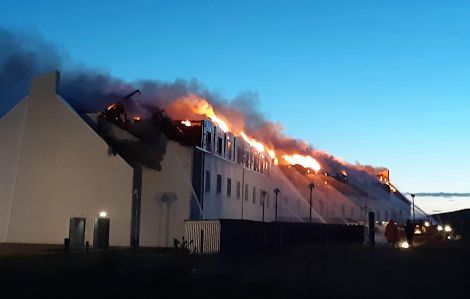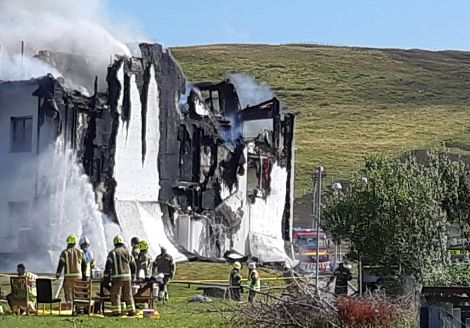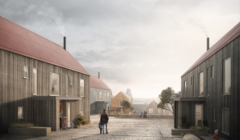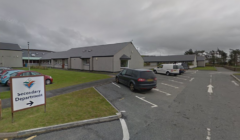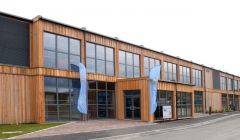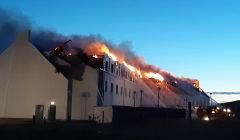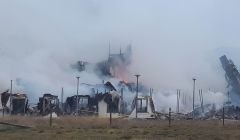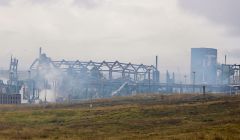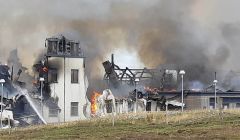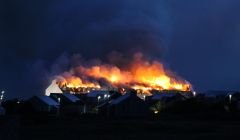Emergency services / Exact cause of Moorfield Hotel fire remains unclear
An investigation into the blaze however pinpointed a Sky satellite box enclosure within a laundry store as the likely origin
THE CAUSE of last year’s Moorfield Hotel fire remains “undetermined” – but the origins of the blaze was likely in the electrics within a Sky satellite box enclosure.
That is the view of the fire service following a full investigation into the blaze.
The 100-bedroom hotel, in Brae, burned to the ground last summer, with no one injured.
A report obtained through a freedom of information request ruled the fire was not deliberate.
But the report also raised questions about some aspects of the modular construction of the building, which was pre-made in parts in Northern Ireland and shipped to Shetland before being erected room by room on site in 2013.
Referring to the night in question, the report says a staff member noticed three foot high flames near the power supply to a number of Sky boxes in a laundry store on the second floor.
The worker believed that the fire had started within one of the plug adaptors.
But the report says the rapid spread of the fire “could be consistent with a fault in the electrical system, causing a fire travelling in the building voids or wall cavity”.
This then may have spread without activating the fire detection system, broke into the housekeeping room and then activated the fire alarm system.
Due to the severity of the fire it is not possible to determine the ignition source or the item which first ignited.
The report was written last year, but an initial freedom of information request in 2020 from Shetland News was turned down because the Scottish Fire and Rescue Service considered there was a “substantial risk that the outcome of any ongoing investigations and any related court proceedings could be significantly prejudiced” by the disclosure of the information.
The report says that it would have been around 12.05am on 27 July that the alarms went off in the hotel, causing staff to investigate.
Become a member of Shetland News
Within just a couple of minutes the call was made to the fire service, and ten minutes later a Brae appliance was mobilised.
Crews initially went inside the hotel but by 1.40am the whole top floor of the building was “well alight”.
Fire fighters from across Shetland attended at various points until the ‘stop’ message came in two days after the alarm was raised.
With regards to the construction of the three-storey building, fire engineer Alison Scott said there was a lack of information about the structural insulated panels (SIP) used in the hotel.
In this case they were insulating foam core sandwiched between two structural facings, but the report said there was “no information as to what was on top of the SIPs to give the fire resistance of 30/60 minutes”.
Scott said the SIP panels are only approved for use in domestic buildings up to two storeys.
She also claimed the hotel plans “appear to show misalignment of compartmentation”.
The report adds there is no information provided within the hotel plans detailing the cavities within the roof space, and that the building’s fire strategy is “not aligned to the plans for the hotel”.
Concluding the report, Scott said: “The Moorfield Hotel was a relatively new, modern building. There are a number of questions raised in this report that will be explored further in an SFRS [Scottish Fire and Rescue Service] led case study to support performance improvement for SFRS staff and our partners in local authority building control and potentially the wider construction industry.
“It would appear that the fire was detected at an advanced stage. Fire spread was rapid and unchecked as it spread to the roof space and other floors of the hotel.
“A further, detailed study of the construction materials and method of construction may provide further insight as to why the fire spread as quickly as it did.
“Evacuation was successful which is testament to the fire warning and detection system operation and the actions of hotel staff and guests in response to the alarm signal.
“Potential regulatory change regarding remote rural risk, and the cost/benefit of suppression systems, in similar projects in future should form part of the ongoing discussions between SFRS and Building Standards Division to support enhanced building sustainability, reduce the impact of fire on communities and improve fire fighter and public safety.
“Organisational learning from the incident should be shared, with particular emphasis on statutory consultation with SFRS at building warrant stage. The SFRS Prevention and Protection Function will develop a case study and engage with appropriate partners to develop a better understanding of the circumstances and share the lessons learned.”
Moorfield Hotel owner BDL Shetland has been contacted for comment.
Become a member of Shetland News
Shetland News is asking its many readers to consider paying for membership to get additional features and services: -
- Remove non-local ads;
- Bookmark posts to read later;
- Exclusive curated weekly newsletter;
- Hide membership messages;
- Comments open for discussion.
If you appreciate what we do and feel strongly about impartial local journalism, then please become a member of Shetland News by either making a single payment, or setting up a monthly, quarterly or yearly subscription.






